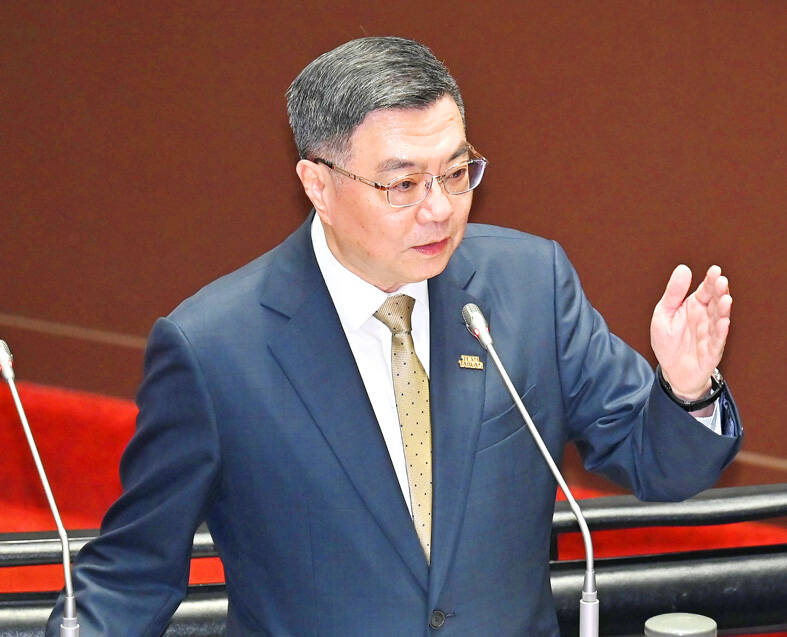The 32 percent tariff US President Donald Trump announced last week for Taiwan is considered “extremely high,” so the government has proposed a NT$88 billion (US$2.69 billion) support package for the worst-case scenario, Premier Cho Jung-tai (卓榮泰) said in a presentation at the legislature on Friday.
A tariff of 30 percent or higher would have the most significant impact among the three scenarios for which the government had drafted responses, he said.
The “low” tariff scenario would have been a 10 percent to 20 percent levy, which would have had a manageable impact on local industries and its support plan would have cost NT$36.1 billion, Cho said.

Photo: Tu Chien-jung, Taipei Times
The “high” tariff scenario was a 20 percent to 30 percent duty, which would have had a high risk of impacting manufacturing sectors such as machinery and electronics, and the exports of agricultural and fishery products, which would have needed a support plan of about NT$57.6 billion, he said.
The “reciprocal” tariffs for countries the US has a trade deficit with were scheduled to take effect on Wednesday last week, but Trump announced a 90-day pause on the new measures, while retaining the 10 percent duties imposed last Saturday on nearly all countries and territories.
The 32 percent tariff for Taiwan is higher than the 24 percent and 25 percent duty set for Japan and South Korea respectively.
The nation is expected to see a drop of at least 21 percent in the value of goods shipped to the US, as US buyers are to see higher prices for products from Taiwan.
To avoid US clients placing orders with competitors in other countries, Taiwanese businesses would have to consider moving manufacturing to locations abroad to stay competitive in the global market, Cho said.
The local manufacturing sector is likely to see a 5 percent drop in production value, and 125,000 jobs could be at stake, he said.
The agricultural sector would also be hit by the sweeping 32 percent tariff, because of the added cost of exporting products to the US, estimated at NT$320 million for orchids, NT$460 million for tilapia and NT$110 million for mahi-mahi, or dolphin fish, Cho said.
Cho hoped to obtain lawmakers’ support for the administration’s NT$88 billion proposal, which aimed to mitigate the tariff’s impact over a four-year period.
The support plans would be funded through a special budget and requires legislative approval.
In addition to the proposed plans and trade negotiations with the US, the government would also tackle other trade issues, including export controls on advanced technology and Chinese products “dumped” on the US market through a third country, such as Taiwan and Vietnam, he said.
As the US has imposed 145 percent tariffs on China, the government would also prevent China from “dumping” cheap products in markets outside the US, including Taiwan, he added.

POSITIVE DEVELOPMENT: Japan and the US are expected to hold in-depth discussions on Taiwan-related issues during the meeting next month, Japanese sources said The holding of a Japan-US leaders’ meeting ahead of US President Donald Trump’s visit to China is positive news for Taiwan, former Japan-Taiwan Exchange Association representative Hiroyasu Izumi said yesterday. After the Liberal Democratic Party’s landslide victory in Japan’s House of Representatives election, Japanese Prime Minister Sanae Takaichi is scheduled to visit the US next month, where she is to meet with Trump ahead of the US president’s planned visit to China from March 31 to April 2 for a meeting with Chinese President Xi Jinping (習近平). Japan and the US are expected to hold in-depth discussions on Taiwan-related issues during the

‘LIKE-MINDED PARTNER’: Tako van Popta said it would be inappropriate to delay signing the deal with Taiwan because of China, adding he would promote the issue Canadian senators have stressed Taiwan’s importance for international trade and expressed enthusiasm for ensuring the Taiwan-Canada trade cooperation framework agreement is implemented this year. Representative to Canada Harry Tseng (曾厚仁) in an interview with the Central News Agency (CNA) said he was increasingly uneasy about Ottawa’s delays in signing the agreement, especially as Ottawa has warmed toward Beijing. There are “no negotiations left. Not only [is it] initialed, we have three versions of the text ready: English, French and Mandarin,” Tseng said. “That tells you how close we are to the final signature.” Tseng said that he hoped Canadian Prime Minister Mark Carney

President William Lai (賴清德) yesterday bestowed one of Taiwan’s highest honors on Saint Vincent and the Grenadines (SVG) Ambassador Andrea Clare Bowman in recognition of her contributions to bilateral ties. “By conferring the Order of Brilliant Star with Grand Cordon on Ambassador Bowman today, I want to sincerely thank her, on behalf of the Taiwanese people, for her outstanding contribution to deepening diplomatic ties between Taiwan and SVG,” Lai said at a ceremony held at the Presidential Office in Taipei. He noted that Bowman became SVG’s first ambassador to Taiwan in 2019 and

A man walks past elementary school artworks at the Taipei Lantern Festival in Ximen District yesterday, the first day of the event. The festival is to run from 5pm to 10pm through March 15.